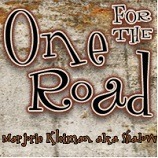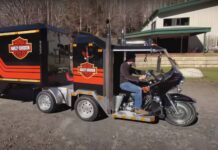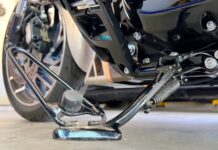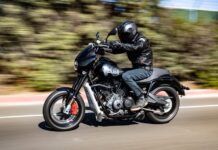 The announcement came just a few days ago, early Saturday morning. According to the V-Twin Expo’s Facebook page and website, the annual industry trade show has been canceled, and I quote, “due to factors beyond our control, which ultimately affect the overall event quality.” Although not shocking news by any means—parent company Paisano Publications has put the entire Easyriders magazine family and events business up for auction—many of us are somewhat sad. In the past, the Expo was considered a bellwether of the V-twin market. And a goodly number of us will miss the annual connections we made with others in the industry, not to mention the lavish banquet, invite-only Super Bowl bash, and numerous other parties that accompanied the affair.
The announcement came just a few days ago, early Saturday morning. According to the V-Twin Expo’s Facebook page and website, the annual industry trade show has been canceled, and I quote, “due to factors beyond our control, which ultimately affect the overall event quality.” Although not shocking news by any means—parent company Paisano Publications has put the entire Easyriders magazine family and events business up for auction—many of us are somewhat sad. In the past, the Expo was considered a bellwether of the V-twin market. And a goodly number of us will miss the annual connections we made with others in the industry, not to mention the lavish banquet, invite-only Super Bowl bash, and numerous other parties that accompanied the affair.
For that one weekend every February since 2001, the Duke Energy Center in Cincinnati, Ohio, was epicenter of the V-twin world. It was where manufacturers trotted out their latest parts and accessories for dealers to ooh and aah over, and most importantly, place product orders in time for the start of the riding season. It’s where trends were set, business relationships formed, and first-time vendors gauged dealer interest in their nifty new gewgaws. In its heyday, the Expo took over the entire first floor and lobby of the convention center along with a goodly portion of the third floor. Over the past decade, as the motorcycle industry contracted, so did the show, with the last iteration in 2017 occupying only a small portion of the main exhibit hall.
The sluggish economy was certainly a key reason for the show’s shrinking. At the same time, other industry events, some in direct competition, had sprung up, making travel costs and absence of key staff for multiple trips quite challenging for dealers as well as exhibitors. And with online ordering firmly ensconced in just about every retail shop, trade show special pricing isn’t the draw it once was. Call it the perfect storm.
A variety of other reasons could be cited, but one that few talk about is the fact that independent shops aren’t, for the most part, unified in any meaningful way. Franchise dealers have their dealer associations to rely on for mutual support, knowledge sharing, and other areas that benefit their membership. Parts manufacturers have at least one major organization that provides competitive information to their members and advances their interests regarding both helpful and harmful legislation.
Conventional wisdom is that most independent motorcycle shops weren’t founded as a way to get rich quick, or for ego, both of which seemed to attract some newly-hatched franchise dealers during the industry’s boom times. Rather, shadetree mechanics who enjoyed working on their own bikes and those of their friends, and racers that did their own performance and tuning upgrades because they couldn’t find anyone to make their bikes go faster were the people who transitioned from working off a single lift in a one-car garage into opening a full-blown shop with real customers walking through the door. But many of these emerging entrepreneurs carried their fierce independence, their lone wolf and sometimes anti-social personas with them into their businesses, and when approached by fledgling organizations to enlist, most demurred, preferring to avoid the politics inherent in such structures, not to mention the suspicion of such groups, and deal with challenges either on their own or within a small circle of trusted peers.
This mindset seems to pervade the motorcycle world in general, with most riders unaffiliated with motorcyclists’ rights or similar associations. Add to this the conflicts between certain clubs, the disdain of certain brand aficionados towards riders of other bikes deemed inferior, and it makes for a huge constituency of riders with vastly different agendas, resulting in an uphill battle when we look to preserve the lifestyle we love.
But I digress. One constant in this world is change, and our own little corner of the world isn’t immune. Since the time I first got involved with motorcycling, I’ve seen the pendulum swing, in lockstep with the economy, from maintaining and repairing one’s bike to keep it on the road for many more years, to purchasing expensive high-end models and even pricier one-off customs, and back again to fixing that old bike that’s been sitting in the garage rather than buying yet another new one. Retro has gotten huge, whether it’s building, showing or racing with that vintage machine. Where big money was valued at the beginning of this millennium, the ability to wrench is today’s currency. Loosely organized grassroots events have once more taken hold of the culture, reminiscent of my younger days but this time around, I’m able to appreciate the unregulated, unfettered, off-the-radar kind of fun that, for a while, seemed to disappear from the landscape. Yes, some of you have always held these values, but now this lifestyle is reaching a much wider audience, vastly proliferated by social media.
And with change comes casualties. The V-Twin Expo isn’t the only trade show that’s folded within the past few years. The closing sentence of my write-up of the most recent Expo reads: “It remains to be seen whether the American V-twin market will continue to support the only trade show of its kind.” There is, in fact, a newer tradeshow kid on the block. Is this the answer for supporting and advancing the motorcycle industry? Or will we return to our roots, eschewing the formalities of exhibit halls and 12’x12’ vendor booths? Maybe it’s time for something different. And that also remains to be seen.



















[…] Re: On The Road: Turning the Tide […]